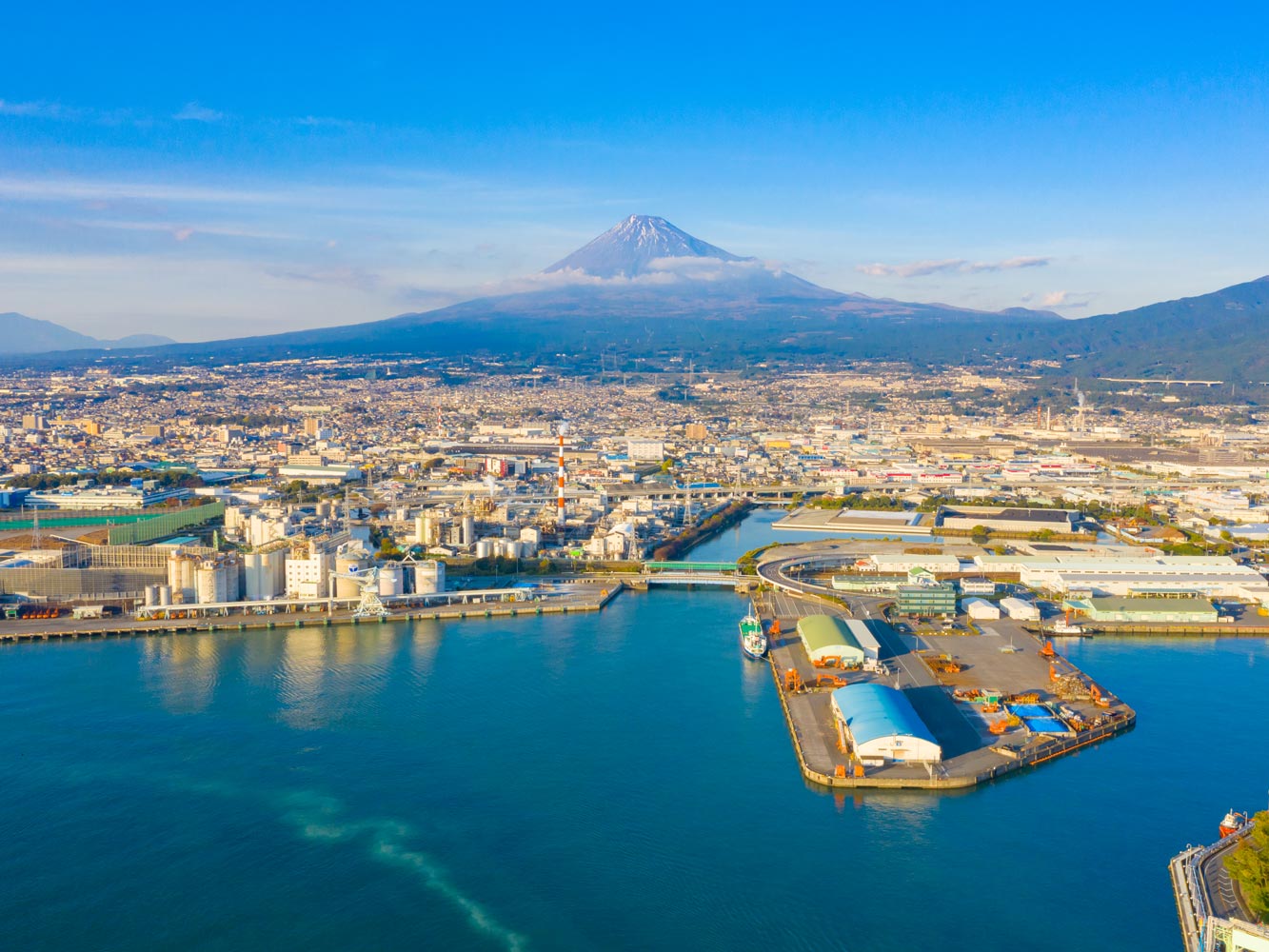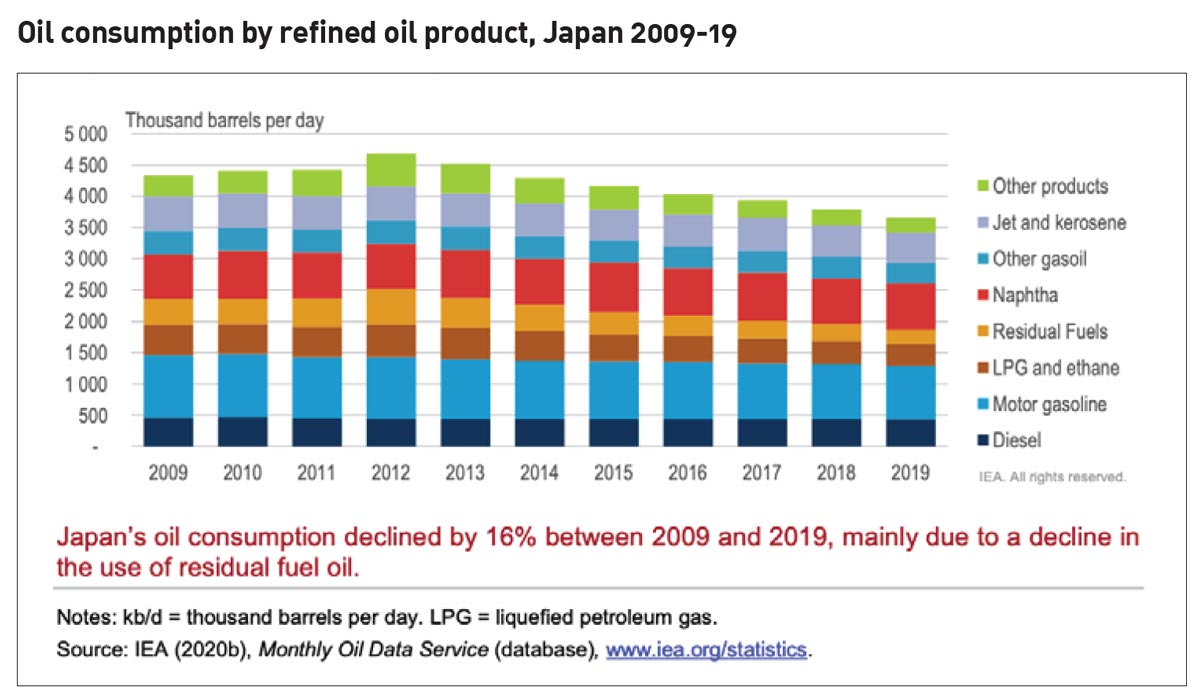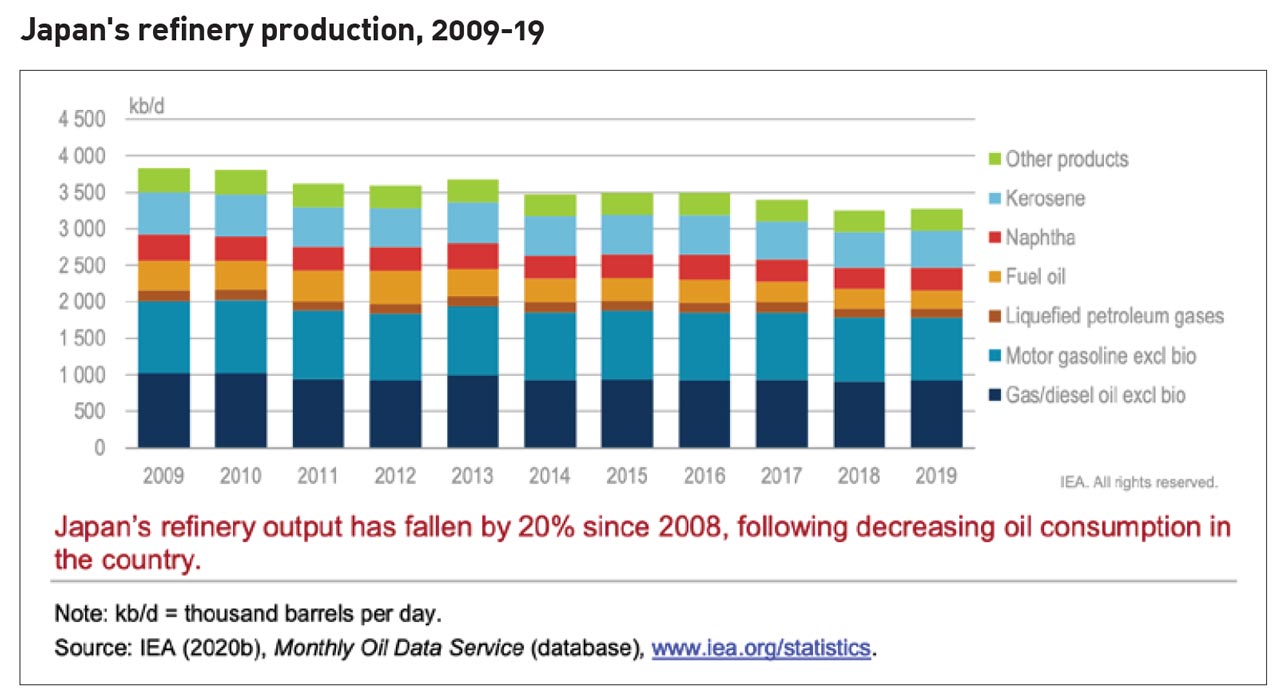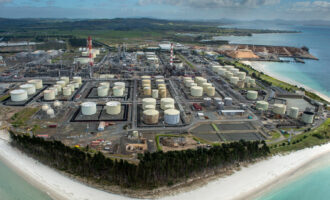
Japan’s oil industry braces for a much smaller domestic market
Japan was the world’s fifth-largest oil consumer and the largest importer of liquefied natural gas (LNG) in 2019. However, Japan’s energy industry is at a crossroads with low annual GDP increases, a strong focus on energy efficiency improvements and conservation, and the intricacies of the local population stifling energy growth. Japan recorded its ninth consecutive annual population decline in 2019 with decreases accelerating in recent years. A uniquely high ratio of seniors and a population collapse brings with it economic and social repercussions — including a decrease in growth potential.
Oil consumption fell more than one million barrels per day (bpd) in the seven years to 2019, to an estimated 3.7 million bpd. While oil remains the largest source of primary energy, its share of total energy consumption has fallen to 40% in 2019 — from 80% in the 1970s, according to data from the U.S. Energy Information Administration (EIA). In 2014, the Japanese government mandated that oil companies reduce crude oil processing capacity in response to a trend of declining fuel demand based on the Law Concerning Sophisticated Methods of Energy Supply Structures.
Oil consumption has decreased in all sectors, with the largest declines observed in the power sector and transport, at 62% and 11% respectively between 2008 and 2018, according to the International Energy Agency (IEA). In 2018, the latest sectoral data available, the transport sector represented 41.2% of Japan’s total oil consumption, while the industry sector accounted for 29.7%, of which more than half was non-energy consumption in chemical and petrochemical industries. Power generation represented only 5.4% of Japan’s total oil consumption.
With virtually no fossil fuels, Japan is heavily reliant on imports and is currently the fourth-largest crude oil importer in the world. In 2018, Japan’s crude oil imports hit record lows alongside an increase in alternative fuels, an expanding fleet of hybrid and electric vehicles, and a slight rise in nuclear power. In the same year, the Japanese government outlined a plan to reduce hydrocarbon fuel imports and increase nuclear-fired power production — by 2030 — to improve energy self-sufficiency. A drop in the price of solar and wind power is also likely to boost renewable energy share during the post-Covid-19 recovery.

Japan is one of several Asian nations that have pledged to reshape energy flows and achieve carbon neutrality, by 2050. Prime Minister Yoshihide Suga announced the major shift in Japan’s position on climate change in October 2020. Fossil fuels account for 88% of total primary energy supply (TPES) in Japan, according to the IEA. In a 2021 review of Japan’s energy policy, the IEA suggested the pacific nation needs to substantially increase its deployment of low-carbon technologies, address regulatory and institutional barriers, and enhance competition in its energy markets.
Off the back of the zero-carbon announcement, the government presented Japan’s Green Growth Strategy in December 2020. The strategy highlights 14 potential growth sectors that align with its 2050 ambition including an ambitious expansion of renewables, a recovery of nuclear power and the deployment of new technologies, including low-carbon hydrogen and carbon recycling. The strategy projects 50%-60% of electricity demand in 2050 will come from renewables, 10% from hydrogen and ammonia, and the remainder from nuclear and thermal plants with carbon capture.
While LNG use in Japan is likely to increase in the short term, oil and gas firms are preparing for a much smaller domestic market. Several traditional Japanese oil companies are undergoing structural changes to transform their businesses and enhance enterprise value alongside declining oil demand. Japan is the fourth-largest country by refining capacity in the Asia-Pacific region.
Japan had 22 operating refineries with a total crude distillation capacity of 3.52 million bpd in 2018. Its refining capacity has decreased by 20% since 2013. Japan produced 3.28 million bpd of oil products in 2019, representing an average refinery utilisation rate of 92%.
Japanese oil product production has fallen by 14% since 2009, with the biggest drop (38%) seen for fuel oil. Japan’s refineries are mostly designed to process heavier and sour crude oil grades, which affects potential diversification of crude oil imports and refinery yields. In 2019, Japan’s crude oil processing output was 28% for diesel fuel, 26% for gasoline, 16% for kerosene, 9% for naphtha, 8% for fuel oil and 4% for LPG.
In the near term, the government expects domestic demand for petroleum products to decline by 1.3% per year on average (from 3.74 million bpd in 2018 to 3.5 million bpd in 2023). In particular, demand for gasoline is expected to decline from 860,000 bpd in 2018 to 779,000 bpd in 2023. The Japanese government does not foresee further reductions in fuel oil consumption for electricity generation, as it has plateaued at 0.2 million bpd in 2018, the lowest level on record, and is anticipated to remain at this level for emergency and disaster response purposes.
Despite declining oil consumption, the 5th Strategic Energy Plan (SEP), Japan’s overarching energy policy document adopted in July 2018, states that oil will remain a crucial part of Japan’s energy mix, given its importance in the transport sector as well as for manufacturing industries. Given the well-developed nationwide supply network and abundant oil stockpiles, oil can also serve as an alternative when other energy sources have been lost, as was the case in the aftermath of the Fukushima accident in 2011.

The continuous decline in demand for oil has consequences for the domestic market structure, pushing consolidations and adaption of operators to make them better prepared for market competition under declining demand. Following a series of mergers, acquisitions and market restructuring, the number of major refining companies has dropped over the last four decades, from 17 to 5 in 2019.
Recent examples of corporate consolidations include JX Energy Corporation acquiring TonenGeneral Sekiyu K.K. in 2017 and renaming it JXTG Nippon Oil & Energy Corporation; and Showa Shell Sekiyu K.K. and Idemitsu Kosan integrating their businesses and operations through the exchange of shares in April 2019. It is hoped that the deal will allow both Idemitsu and Showa Shell Sekiyu to accelerate expansion in the domestic market and to raise the competitiveness of the Japanese refining industry in the international arena.
ENEOS Holdings is the largest oil refiner in Japan with nine refineries and a combined capacity of 1.62 million bpd, (46% of the country’s total). ENEOS accounts for 50% of the fuel sales market in Japan. Formerly JXTG Holdings, the company underwent a name change in June 2020 as part of a wider company reorganisation. The new name, a mash-up of the words neos (meaning ‘new’ in Greek) and energy, reflects a broadening energy portfolio. Oil refining subsidiary JXTG Nippon Oil & Energy has also had its name changed to ENEOS. The ENEOS brand is already used across the company’s 13,000 service stations in Japan. JX Nippon Oil & Gas Exploration Corporation and JX Nippon Mining & Metals Corporation will maintain their current brands.
ENEOS has committed to transforming its operations to be carbon neutral by 2040. The oil giant expects total fuel demand, and the number of domestic refiners, to drop 50% by 2040, according to reports by Argus Media. With the release of its long-term vision in May 2020, ENEOS predicted a sustainable and vibrant future through investment in petrochemicals, materials, and next-generation energy supply to achieve growth, and by maximising cash flow from its petroleum refining and marketing, oil and natural gas, and metals businesses.

Idemitsu Kosan is the second largest oil refiner in Japan, operating five refineries with 0.83 million bpd total capacity and is active in the petrochemical and minerals sectors. Cosmo Oil Co. operates three refineries with 0.36 million bpd total capacity and Taiyo Co. runs a refinery with 0.14 million bpd of total capacity.
Idemitsu Kosan predicts a 70% decline in Japanese oil demand by 2050, according to Argus Media. The company has been preparing for the declining demand for petroleum products and what it terms a tough managerial environment. On 1 April 2019, Idemitsu Kosan completed a long-anticipated merger with Showa Shell Sekiyu K.K. President and representative director of Idemitsu Kosan, Shunichi Kito, labelled the move the “first step toward the next 100 years.” The merger is expected to improve the competitiveness of the combined companies through efficiencies in crude oil procurement, refining, and distribution — in a shrinking market. Business will be conducted under the Idemitsu Showa Shell trade name, with the new entity accounting for 30% of domestic gasoline sales. At the time of the merger, the company expressed a desire to urgently unify Idemitsu Kosan’s 6,500 gas stations and the 3,000 gas stations from Showa Shell.
The agreement comprised Showa Shell’s oil refineries, fuel retail, and lubricant businesses. In 2017, the lubricant business had been split into a wholly-owned subsidiary — Shell Lubricants Japan. Just 11 months after the merger, Idemitsu Kosan confirmed it was negotiating the sale of Shell Lubricants Japan back to Royal Dutch Shell — citing difficulties in managing competing lubricant brands. The company intends to focus its management efforts on Idemitsu-branded lubricants. On 6 August 2020, the two companies entered into a share purchase agreement, with completion of the deal for Shell to acquire 100% of Shell Lubricants Japan shares occurring on 5 January 2021.
What does this change mean for the future of Shell lubricants in one of Asia’s leading markets? Some analysts have speculated that Shell risks losing market position in Japan and indeed across Asia — with no commitment beyond April 2021 to sell Shell-branded lubricants in Idemitsu Kosan service stations. Conversely, some believe Shell will maintain the valuable business-to-business segment through other marketing channels such as car dealers, automotive parts shops and OEM relationships.
Idemitsu also launched what some have termed a “lowball” tender offer on 16 December 2020 to purchase its affiliate Toa Oil Co. Ltd. Toa Oil Co. Ltd is mainly engaged in the petroleum refining and electricity wholesale supply business. However, the tender offer did not reach the minimum planned purchase quantity of 2,058,875 shares and the tender offer has now been withdrawn.
In addition, various oil refining and distribution companies pursued collaboration or decided to move parts of their business operations to other activities. For example, in July 2019, then JXTG announced that the refinery in Osaka — which the company runs through a joint-venture with Petro-China – would stop refining oil and convert the site into an asphalt-fuelled power plant in October 2020.








